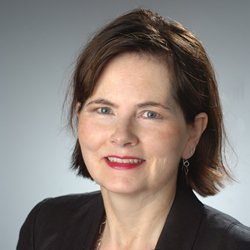Dympna Callaghan awarded Bogliasco Fellowship
Shakespearean scholar to spend a month on the Italian Riviera

Dympna Callaghan, the William L. Safire Professor of Modern Letters and interim director of the Syracuse University Humanities Center (administered by The College of Arts and Sciences), has been awarded one of the coveted fellowships offered annually by the Bogliasco Foundation. Dedicated exclusively to the humanities, the foundation accepts proposals for projects of advanced scholarly or artistic merit that cover an array of disciplines ranging from architecture to literature.
Callaghan will spend 33 days this spring living and working with collaborator and religious historian Lori Anne Ferrell at the Liguria Study Center on the Italian Riviera. The two colleagues will transform their initial proposal into a book exploring the works of William Shakespeare and their insights into modern religious conflict.
“People in the humanities, especially literature, have been too shy about making claim to the importance of literature and what it can do. … It is really significant to our humanity, to our way of interacting,” Callaghan says.
A noted Shakespeare scholar, Callaghan has been a British Academy Visiting Professor; held fellowships at the Newberry, Huntington and Folger Libraries; and is a life member of Clare Hall, Cambridge University. As an author, she has published several books on literature, including “Shakespeare’s Sonnets,” “Shakespeare Without Women” and this year’s “Who Was William Shakespeare?”
Her work at the Liguria Study Center is partially inspired by Callaghan’s own experiences as an Irish Roman Catholic growing up in England, where she witnessed first hand the effects of escalating religious tensions on the country’s immigrant population in the wake of the IRA bombing campaigns. Using classic Shakespeare texts like “Othello,” “Romeo and Juliet” and “King Lear,” she and Ferrell, a professor of English and history at Claremont Graduate University, hope to draw parallels between modern-day tensions and the theological turmoil that defined the period in which they were written.
“I think that Shakespeare did live and write in a time of unprecedented religious divisiveness and that his work reflects that. We really are committed to the sense that the past speaks to the present and that we can learn from it,” Callaghan says.
Shakespeare emerged as the ideal teacher because his own religion continues to remain a mystery, granting his work neutrality that allowed competing points of view to rise to the surface. Callaghan believes that the bard’s ability to engage his audience with the issues of the day still holds relevance for the way in which a modern civilization engages with itself.
“Political scientists and sociologists have said that its this capacity to empathize with a range of positions that is the source of the way we can get on with one another and have sympathy for a person that doesn’t share our views. It’s the source of tolerance in a civil society,” Callaghan says.
She believes that the proposal she wrote with Ferrell interested the Bogliasco Foundation because it expressed their desire to present the humanities as essential to the human condition instead of as the fringe element they have increasingly been portrayed.
“These plays contain central themes that speak to our humanity. They did at the time that they were written and they do now. We want to really enforce that case very strongly,” Callaghan says.
Media Contact
Rob Enslin
